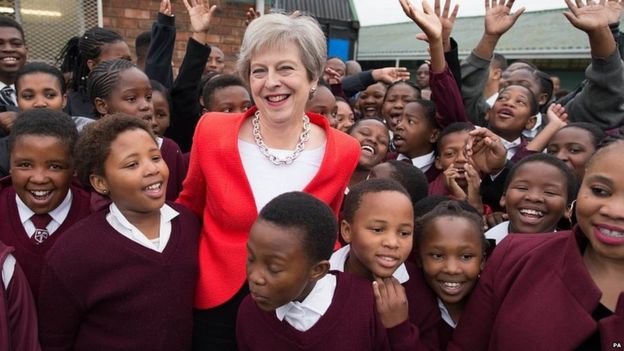
CAPE TOWN, South Africa - Theresa May has announced plans to boost Britain's investment in Africa after Brexit, during her first trip to the continent as prime minister.
In a speech in Cape Town, she pledged £4bn in support for African economies, to create jobs for young people.
She also pledged a "fundamental shift" in aid spending to focus on long-term economic and security challenges rather than short-term poverty reduction.
She will also visit Nigeria and Kenya during the three-day trade mission.
On her way to South Africa, the prime minister also played down warnings from the chancellor about the economic damage a no-deal Brexit could cause.
Talking to journalists on board RAF Voyager on Tuesday morning, Mrs May reiterated that she believed a no-deal Brexit was still better than a bad deal - adding no-deal "wouldn't be the end of the world".
Last week Chancellor Philip Hammond warned in a letter that a no-deal Brexit could damage the economy.
Mrs May's trip - which will see her meet the presidents of all three countries - aims to deepen economic and trade ties with growing African economies ahead of Britain leaving the EU in 2019.
Arriving in South Africa on Tuesday morning, Mrs May said she she wanted the UK to overtake the US to become the G7's biggest investor in Africa by 2022.
She promised to continue existing economic links based on the UK's EU membership - including an EU-wide partnership with the Southern African Customs Union and Mozambique - after Brexit next year.
Promising an extra £4bn in direct UK government investment - which she expects to be matched by the private sector - she said while the UK could not match the "economic might" of some foreign investors - such as China or the US - it offered a unique "high quality and breadth" of investment.
She defended the UK's aid spending in Africa, a target of criticism from some Tory MPs, saying it had "worked" to give millions of children and women an education and immunise millions against deadly diseases.
But she said she was "unashamed" that it had to work in the UK's own interest and pledged a new approach in future, focusing on helping British private sector companies invest in fast-growing countries like Cote D'Ivoire and Senegal while supporting countries, such as Chad, Mail and Niger, in "the frontline of instability".
The UK's overseas aid budget totalled £13.9bn in 2017, an increase of £555m in 2016.
UK direct investment in Africa was £42.7bn in 2016, compared to £44.3bn from the US, £38bn from France and £31bn from China, according to data from the United Nations Conference on Trade and Development.
Mrs May said national self-interest and global co-operation were not in conflict and the UK could play a key role in harnessing the "innovation and creativity" of young people in Africa, 60% of whose population is under the age of 25%.
"The challenges facing Africa are not Africa's alone," she said. "It is the world's interest to see these jobs created."(FA)


